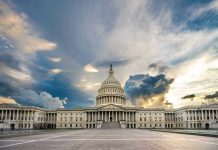
Gavin Newsom’s latest ballot measure threatens to erase California’s independent redistricting, risking voter confusion and undermining reforms approved to stop gerrymandering.
Story Snapshot
- Governor Newsom proposes a ballot measure that would allow the legislature to bypass California’s independent redistricting commission.
- Rep. Kevin Kiley leads bipartisan opposition, warning that the measure’s language is intentionally misleading to voters.
- Bipartisan reform groups join critics, arguing the measure undermines voter-approved reforms and sets a dangerous national precedent.
- The November 2025 vote could accelerate partisan redistricting battles and erode faith in fair elections.
Newsom’s Ballot Language: A Threat to Redistricting Integrity
California’s political landscape is facing a major upheaval as Governor Gavin Newsom and the Democratic supermajority push a ballot measure that would sideline the state’s independent redistricting commission. The proposal, set for a special election in November 2025, would return the power to redraw congressional maps to the legislature—undoing reforms voters enacted to stop backroom gerrymandering. Rep. Kevin Kiley (R-CA) has publicly condemned the language of the measure, accusing Newsom of deliberately confusing voters to obscure the true impact on California’s election integrity.
Newsom’s supporters claim this move is a response to aggressive mid-decade redistricting by Texas Republicans, who announced plans to redraw their own maps to gain more GOP seats. However, critics argue that Newsom’s plan is not about fairness, but about consolidating partisan power at the expense of transparency and public trust. The independent commission that would be bypassed was established by California voters in 2008 and 2010 to take politics out of the process—reforms widely regarded as a national model for nonpartisan map drawing.
Bipartisan and Nonpartisan Concern Over Partisan Power Grab
Bipartisan opposition to Newsom’s proposal has been swift and vocal. Rep. Kiley introduced federal legislation to ban mid-decade redistricting and nullify any new maps drawn before the next census, highlighting the broader threat to fair representation. Nonpartisan groups such as Common Cause and the League of Women Voters of California have joined in, arguing the measure undermines the will of the voters who demanded an end to political manipulation of district lines. These critics warn that Newsom’s ballot language is crafted to downplay the true consequences and deceive Californians into giving up a crucial safeguard for democracy.
The power dynamics are clear: with a Democratic supermajority, the California legislature can move quickly, but the backlash from reformers and ordinary citizens complicates the political calculus. Voters—who ultimately will decide the measure’s fate—face a barrage of conflicting messages as both sides ramp up campaigns ahead of November. The controversy has also drawn national attention, as similar power struggles flare in states like Texas and North Carolina, escalating what many now call a “redistricting war.”
National Implications and Risks to Voter Trust
Analysts warn that if California voters approve Newsom’s measure, it could set a dangerous precedent nationwide, inviting other states to erode independent reforms and return to hyper-partisan map drawing. The short-term impacts include heightened polarization, legal challenges, and mass confusion about district boundaries. In the long run, critics fear an erosion of public trust in elections and a weakening of safeguards meant to keep government accountable to the people. As Rep. Kiley emphasized, the framers of the Constitution intended for the House of Representatives to be closest to the people—a principle threatened when politicians manipulate district lines for their own gain.
Meanwhile, Governor Newsom promises the commission will regain control after the 2030 census, but critics remain skeptical, pointing to the risk of permanent damage to the independent process. The November 2025 vote will test whether Californians are willing to defend reforms that protect their voice, or whether partisan interests will succeed in rewriting the rules to their advantage.
Sources:
TPR: Why Republican Rep. Kevin Kiley wants to stop the national fight over redistricting
IVN: CA Rep: No One Wins If This Redistricting War Continues
NHPR: The Framers wanted the House closest to the people. Redistricting may undermine that
Kevin Kiley official statement



